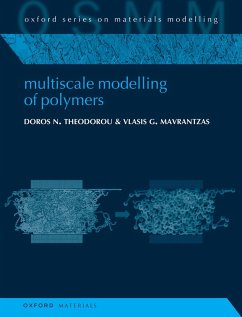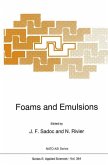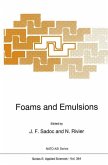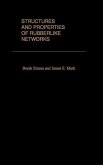- Gebundenes Buch
- Merkliste
- Auf die Merkliste
- Bewerten Bewerten
- Teilen
- Produkt teilen
- Produkterinnerung
- Produkterinnerung
The book provides a comprehensive collection of knowledge about the theory and practice of polymer multiscale modelling methods with significant breadth.
Andere Kunden interessierten sich auch für
![Foams and Emulsions Foams and Emulsions]() Foams and Emulsions287,99 €
Foams and Emulsions287,99 €![Foams and Emulsions Foams and Emulsions]() J.F. Sadoc / N. Rivier (Hgg.)Foams and Emulsions292,99 €
J.F. Sadoc / N. Rivier (Hgg.)Foams and Emulsions292,99 €![Solutions Manual to accompany Organic Chemistry Solutions Manual to accompany Organic Chemistry]() Jonathan ClaydenSolutions Manual to accompany Organic Chemistry55,99 €
Jonathan ClaydenSolutions Manual to accompany Organic Chemistry55,99 €![Organic Synthesis Organic Synthesis]() Douglass F. TaberOrganic Synthesis159,99 €
Douglass F. TaberOrganic Synthesis159,99 €![Organic Synthesis Organic Synthesis]() D F TaberOrganic Synthesis128,99 €
D F TaberOrganic Synthesis128,99 €![Structures and Properties of Rubberlike Networks Structures and Properties of Rubberlike Networks]() Burak ErmanStructures and Properties of Rubberlike Networks160,99 €
Burak ErmanStructures and Properties of Rubberlike Networks160,99 €![Organic Structure Analysis Organic Structure Analysis]() Phillip CrewsOrganic Structure Analysis135,99 €
Phillip CrewsOrganic Structure Analysis135,99 €-
-
-
The book provides a comprehensive collection of knowledge about the theory and practice of polymer multiscale modelling methods with significant breadth.
Produktdetails
- Produktdetails
- Verlag: Oxford University Press
- Seitenzahl: 640
- Erscheinungstermin: 23. Dezember 2025
- Englisch
- Abmessung: 246mm x 189mm
- ISBN-13: 9780199226191
- ISBN-10: 0199226199
- Artikelnr.: 74446323
- Herstellerkennzeichnung
- Libri GmbH
- Europaallee 1
- 36244 Bad Hersfeld
- gpsr@libri.de
- Verlag: Oxford University Press
- Seitenzahl: 640
- Erscheinungstermin: 23. Dezember 2025
- Englisch
- Abmessung: 246mm x 189mm
- ISBN-13: 9780199226191
- ISBN-10: 0199226199
- Artikelnr.: 74446323
- Herstellerkennzeichnung
- Libri GmbH
- Europaallee 1
- 36244 Bad Hersfeld
- gpsr@libri.de
Doros Theodorou received his Diploma in Chemical Engineering from the National Technical University of Athens in 1982, and his M.S. (1983) and Ph.D. (1985) degrees from the Department of Chemical Engineering at the Massachusetts Institute of Technology. He is currently Professor of Chemical Engineering at the National Technical University of Athens. He has previously been Professor of Chemical Engineering at the University of California, Berkeley (1986-1995), and at the University of Patras (1995-2002). From 1986 to 1995 he also held an appointment at the Centre for Advanced Materials in the Division of Materials Sciences at Lawrence Berkeley Laboratory. Vlasis Mavrantzas received his Diploma in Chemical Engineering from the National Technical University of Athens in 1988 and his Ph.D. from the University of Delaware, Department of Chemical Engineering, in 1994. Currently he is Professor of Chemical Engineering at the University of Patras. Since 2016, he is also employed as Dozent-Lecturer in the Department of Mechanical and Process Engineering at ETH Zürich. From 1997 to 2003 he worked at FORTH-ICE/HT in Patras. He has previously been visiting researcher of the Dow Chemical Company and of the University of Tokyo.
1: Models for Polymer Chains
2: From Electronic Structure Calculations to Classical Force Fields
3: Molecular Mechanics
4: Molecular Dynamics
5: Monte Carlo
6: Techniques for the Analysis and Simulation of Infrequent Events.
7: Coarse-graining
8: Entanglement Network-based Simulations of Deformation and Flow
9: Dissipitative Particle Dynamics
10: Beyond-equilibrium Simulations Based on Principles of Non-equilibrium Thermodynamics
2: From Electronic Structure Calculations to Classical Force Fields
3: Molecular Mechanics
4: Molecular Dynamics
5: Monte Carlo
6: Techniques for the Analysis and Simulation of Infrequent Events.
7: Coarse-graining
8: Entanglement Network-based Simulations of Deformation and Flow
9: Dissipitative Particle Dynamics
10: Beyond-equilibrium Simulations Based on Principles of Non-equilibrium Thermodynamics
1: Models for Polymer Chains
2: From Electronic Structure Calculations to Classical Force Fields
3: Molecular Mechanics
4: Molecular Dynamics
5: Monte Carlo
6: Techniques for the Analysis and Simulation of Infrequent Events.
7: Coarse-graining
8: Entanglement Network-based Simulations of Deformation and Flow
9: Dissipitative Particle Dynamics
10: Beyond-equilibrium Simulations Based on Principles of Non-equilibrium Thermodynamics
2: From Electronic Structure Calculations to Classical Force Fields
3: Molecular Mechanics
4: Molecular Dynamics
5: Monte Carlo
6: Techniques for the Analysis and Simulation of Infrequent Events.
7: Coarse-graining
8: Entanglement Network-based Simulations of Deformation and Flow
9: Dissipitative Particle Dynamics
10: Beyond-equilibrium Simulations Based on Principles of Non-equilibrium Thermodynamics








